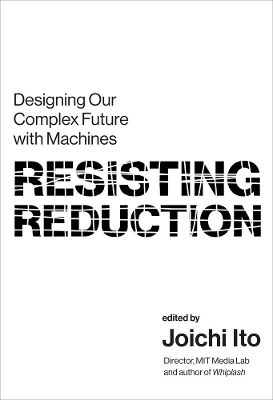
Resisting Reduction
MIT Press (Verlag)
978-0-262-04314-4 (ISBN)
- Titel ist leider vergriffen;
keine Neuauflage - Artikel merken
When Joi Ito published an essay, "Resisting Reduction: A Manifesto," about human flourishing in an age of machine intelligence, his argument against industrial optimizations in the pursuit of growth and for the importance of natural complexity and resilience received such an impassioned response that he invited writers to develop full-length essays continuing the conversation. Resisting Reduction is the result: Ito's manifesto and nine equally provocative responses, all imagining a future that is not limited by a worldview defined by algorithm. Rather than await our inevitable domination by machines, Ito and his respondents argue, we should work toward a future of interconnected complex systems.
Ito blames Silicon Valley's "groupthink" and "cult of technology" for claiming that narrow technical solutions can resolve the world's complex problems. More computing power does not make us more "intelligent," he tells us, only more computationally powerful. In their responses, the other writers offer persuasive and compelling variations on Ito's argument. Among other things, they call for a "Human+AI Centaur" as the best way to augment intelligence; draw on indigenous epistemology to argue for an extended "circle of relationships" that includes the nonhuman and robotic; debunk the myth of the lone pioneer and propose instead a model of adaptive interconnectivity; cast "Snow White" as a tale of AI featuring a "smart mirror"; point out the "cisnormativity" of security protocol algorithms; and consider the limits of moral mathematics.
Contributors
Noelani Arista, Nicky Case, Sasha Costanza-Chock, Vafa Ghazavi, Kat Holmes, Joi Ito, Suzanne aka Kite, Cathryn Klusmeier, Jason Edward Lewis, Molly McCue, Archer Pechawis, Jaclyn Sawyer, Gary Zhexi Zhang, Snoweria Zhang
Joi Ito is Director of the MIT Media Lab, where he is also Professor of the Practice of Media Arts and Sciences. He is the coauthor of Whiplash: How to Survive Our Faster Future. Joi Ito is Director of the MIT Media Lab, where he is also Professor of the Practice of Media Arts and Sciences. He is the coauthor of Whiplash: How to Survive Our Faster Future. Kat Holmes, named one of Fast Company's "Most Creative People in Business" in 2017, is founder of Mismatch.design, a firm with the mission of advancing inclusive education and resources. She served as the Principal Director of Inclusive Design at Microsoft from 2014 to 2017, and led that company's executive program for inclusive product innovation. As an executive at Google and, currently, Salesforce, Holmes continues to advance inclusive development for some of the most influential technologies in the world. Sasha Costanza-Chock (they/them or she/her) is Associate Professor of Civic Media at MIT, a Faculty Associate at the Berkman-Klein Center for Internet & Society at Harvard University, a board member of Allied Media Projects (alliedmedia.org), and the author of numerous articles and two books. Their first book is Out of the Shadows, Into the Streets! Transmedia Organizing and the Immigrant Rights Movement (MIT Press).
| Erscheinungsdatum | 01.10.2019 |
|---|---|
| Reihe/Serie | The MIT Press |
| Co-Autor | Joichi Ito, Nicky Case, Jason Edward Lewis, Noelani Arista |
| Zusatzinfo | 17 b&w illus.; 34 Illustrations, unspecified |
| Sprache | englisch |
| Maße | 137 x 203 mm |
| Themenwelt | Kunst / Musik / Theater ► Design / Innenarchitektur / Mode |
| Naturwissenschaften | |
| ISBN-10 | 0-262-04314-9 / 0262043149 |
| ISBN-13 | 978-0-262-04314-4 / 9780262043144 |
| Zustand | Neuware |
| Haben Sie eine Frage zum Produkt? |
aus dem Bereich


